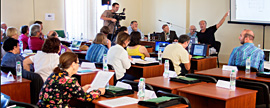The second international conference with the title “Problems of folk polyphony” was held in the resort complex “House of Recreation and Creativity of Composers” in Borjomi, from 10th to 15th November. Scholarly sessions were held in the mornings and afternoons. Concerts of Georgian traditional polyphonic songs were presented by two ensembles from different regions of Georgia every evening. Extended abstracts were published (Jordania, 1986). Here is the list of the scholars and their papers according to the conference program and published extended abstracts:
1. Izaly Zemtsovsky, Russia, Leningrad. “Problems of Musical Dialogue: Antiphon and diaphony”.
2. Ivan Vindgholtz, Russia, Karaganda. “Marius Scheider’s ‘History of Polyphony’ half a century later”.
3. Fedor Arzamanov*, Russia, Moscow. “Some peculiarities of Chinese traditional polyphony.”
4. Nailia Almeeva, Tatarstan, Kazan. “Heterophonic texture: the case of the analyses of the polyphonic songs or Christened Tartars”.
5. Alma Kunanbaeva, Kazakhstan, Leningrad. “Hierarchy of the stable elements of Kazakh epic singing in the system of “voice-instrument”.
6. Oksana Nikitenko, Russia, Leningrad. “Creating a polyphonic model in a musical culture”.
7. Evsevi Chokhonelidze, Georgia. Tbilisi. “On some problems of Georgian folk polyphony”.
8. Viktor Kartsovnik, Russia, Leningrad. “Yuri Krizhanich on Byzantine polyphony”.
9. Mzia Iashvili, Georgia, Tbilisi. “Unity of contrasts [ertobai shekovlebisai] and the antiquity of the Georgian tradition of polyphonic singing”.
10. Nino Pirtskhalava, Georgia, Tbilisi. “Georgian three-part polyphony and the musical-aesthetic thought of Ioanne Petritsi”.
11. Nikolai Kauffmann, Bulgaria, Sofia. “Traditional polyphony in Bulgarian professional music”.
12. Zinaida Mozheiko*, Belarus, Minsk. “The tradition of polyphonic singing in Belarus Polesie”.
13. Nikolai Bojarkin, Mordovia, Saransk. “On links between vocal and instrumental music of Mordvinians”.
14. Valerian Magradze, Georgia, Tbilisi. “On the method of the reconstruction of the polyphonic singing of Meskheti”.
15. Nino Kalandadze, Georgia, Tbilisi. “Polyphonic lullabies”.
16. Nato Zumbadze, Georgia, Tbilisi. “On the peculiarities of women’s polyphony in Georgia”.
17. Edisher Garakanidze, Georgia, Tbilisi. “Interrelationships between Acharo-Shavshetian, Gurian and Svan musical dialects of Georgian traditional music”.
18. Anatoly Rakhaev, North Caucasia, Nalchik. “The problem of choral accompaniment “Ezhu” in Balkarian traditional singing”.
19. Tamara Blaeva, North Caucasia, Nalchik. “Peculiarities of the polyphonic texture in Adighian traditional songs”.
20. Igor Macievsky, Russia, Leningrad. “The problem of forming Instrumental Polyphony among East Slavs and Balts”.
21. Vaike Sarv, Estonia, Tallinn, Estonia. “The main types of polyphony in Setu traditional song”.
22. Urve Lippus, Estonia, Tallinn. “Two-part singing in older songs of south Estonia”.
23. Nugzar Jordania, Georgia, Tbilisi. “The form of Trio in a singing tradition of Western Georgia”.
24. Laima Burkshtaitene, Lithuania, Vilnius. “Problems of the emergence of the late polyphonic style in northeastern Lithuania”.
25. Ketevan Nikoladze, Georgia, Tbilisi. “Double blown instruments and the problem of vocal polyphony”.
26. Ketevan Baiashvili, Georgia, Tbilisi. “The problem of assimilation of polyphonic traditions (on the example of Ertso-Tianeti)”.
27. Khristofor Arakelov, Georgia, Tbilisi. “Cadences in Georgian (Svan) polyphonic choral songs”.
28. Gulnara Gvardjaladze, Georgia, Tbilisi. “Aspects of rthythm in Georgian polyphonic song”.
29. Tamaz Gabisonia, Georgia, Tbilisi. “Compositional principles and types of Georgian traditional polyphony”.
30. Oscar Elschek, Slovakia, Bratislava. “Traditional polyphony in European musical cultures”.
31. Yulia Evdokimova*, Russia, Moscow. “On typology and cartography of European polyphonic regions”.
32. Todor Todorov*, Bulgaria, Sofia. “The problem of polyphony in the research of Bulgarian ethomusicologists”.
33. Villis Bendorf, Latvia, Riga. “On the relationship between Baltic and Balkan polyphonic traditions”.
34. Dunja Rihtman-Sotric, Bosnia, Sarajevo. “Polyphonic forms in Bosnia and Herzegovina”.
35. Radmila Petrovich, Serbia, Beograd. “Two-part singing in Serbia”.
36. Anaid Bagdasarian, Armenia, Erevan. “Elements of polyphony in Armenian monodic music”.
37. Oleg Gerasimov, Mari, Russia. Yoshkar-Ola. “The principle of establishing the polyphonic texture in traditional Mari songs”.
38. T. Ignatieva, V. Nikiforova, Russia, Novosibirsk. “Peculiarities of traditional texture in Yakutian “Osuokai”.
39. Martin Boiko, Latvia, Riga. “Relicts of Sutartines in Latvia”.
40. Daiva Rachiunaite, Lithuania, Vilnius. “Forms of Lithuanian linear polyphony”.
41. Elena Murzina, Ukraine, Kiev. “Polyphony as a dynamic phenomenon of the traditional musical culture of the Ukraine”.
42. Tatiana Rudichenko, Russia, Rostov. “The role of traditional timbre in the surviving polyphonic singing culture on the river Don”.
43. Nadia Zhulanova, Russia, Perm. “Stylistic differences in the local traditions of vocal polyphony of the Komi-Permiaks”.
44. Nino Tsitsishvili, Georgia. Tbilisi. “On South-Slavic – Georgian musical and ethnogenetic links”.
45. Joseph Jordania, Georgia, Tbilisi. “Polyphony and ethno-genesis”.




